#CRITICAL THINKING
Text
what keeps me up at night? (spoilers ahead for aot and jjk)
the parallels of levi and gojo. and how people lack comprehension skills and mischaracterize both characters to attractive older men.
now i’ve always seen the similarity but was never able to put it to words so shoutout to @/lauravpvp on tiktok. they talked about levi and gojo having to bear the title of ‘the strongest’ but not the chosen one. In both of their respective worlds they were treated like weapon, the solution to all the problems, they weren’t allowed to show their weakness even in grief because they were the hope the world relied on. But neither Levi or Gojo are the main characters, even in the end their strength, abilities, skills, could not save their worlds alone. Quite tragic and ironic that these heros aren’t able to save their worlds. So you would think they would do everything to protect their closest friend? NOPE! they know their role in the world they know they have to make sacrifices for the greater good. Did Levi want to choose armin over erwin? No, but he had to. Did Gojo want to kill sugeru? No, again he had to. All for the greater good. So you would think maybe they would get a little grace from their universe, WRONG AGAIN. time and time again they are faced with death and loss. over and over again. death of children and adults they cannot mourn over all of them but they keep living to fight for them and not let their deaths be in vein. even after all the hell their universe has put them through they still protect the kids who were put under their wing.
and to really top it off, levi and gojo saw the potential a kid could have to change the world. only to get betrayed by them and nearly get killed/killed (sorry gojo may he rest) by them. (yuji did nawt kill gojo but it was his body that sukuna that did blow off our blue eyed kings torso so i can’t imagine the pain he felt knowing the body of the kid he had faith in was the one to end him)
they are my roman empire. thank u for my late night ted talk
#jjk#jujutsu kaisen#aot#attack on titan#gojo satoru#jjk gojo#levi ackerman#levi aot#critical thinking#i’m tired of people not understand characters and shows like how are u constantly on the internet and can’t critically think#brain dump#late night thoughts
23 notes
·
View notes
Text
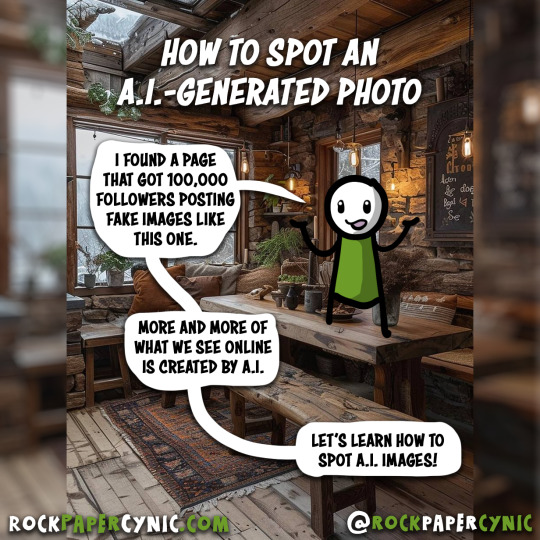

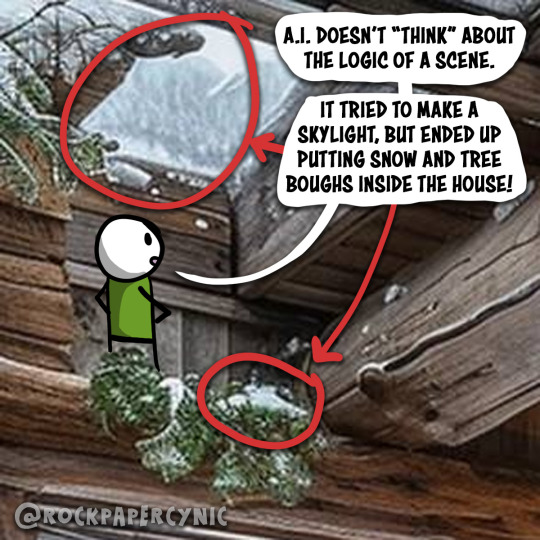
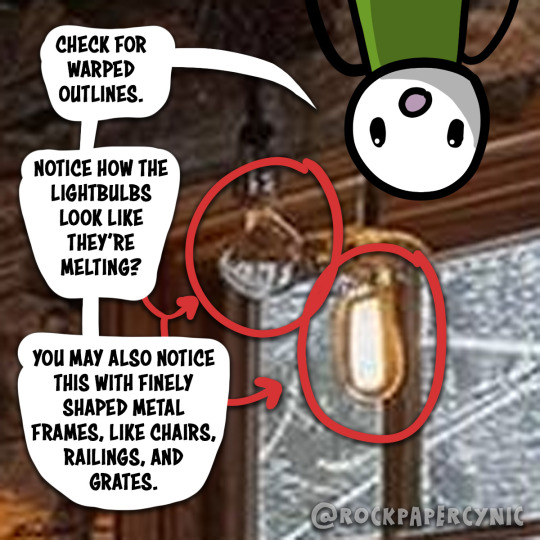
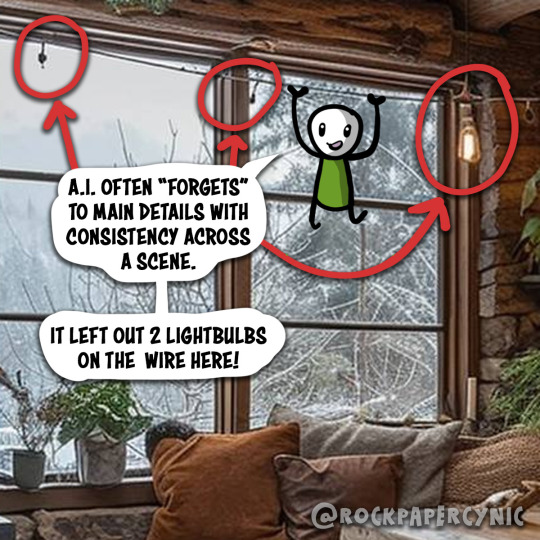
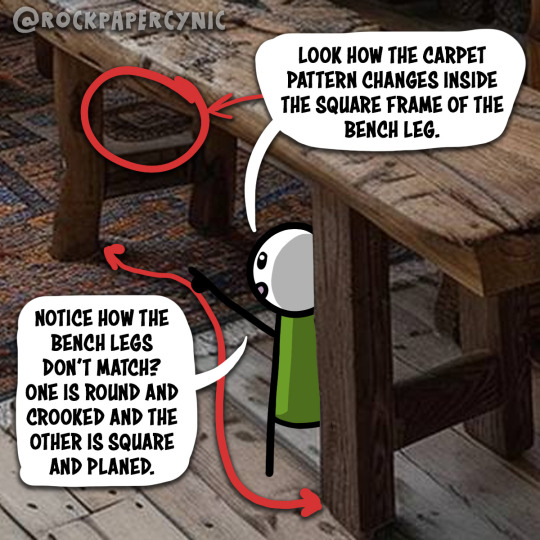

A.I. photos are flooding social media and contributing to an Internet where we can't believe what we see. Spotting A.I. 📷s is an important media literacy skill.
None of us have time to research every image we see. We just need people to notice BEFORE THEY LIKE OR SHARE that an image might be fake. If unsure, check it or don't share.
I've started drawing some comics explaining the basic of AI spot-checking and media literacy in the age of disinformation. Follow along here or on my Twitter.
31K notes
·
View notes
Text
Every Robin After Becoming Robin: omg bruce didn’t replace you!!!! your literally perfect in his eyes. you can do no wrong. and he looks at me and ……. he sees all the ways you were better. he loves you ….. i cant replace you when we dont even compare !
Every Robin When Someone Else Becomes Robin: this mf replaced me
#like guys come on#critical thinking#batfam#batfamily#batman#bruce wayne#robin#batman and robin#dick grayson#Jason Todd#Tim Drake#stephanie brown#damian wayne#2k
18K notes
·
View notes
Text
A lot of propaganda is not actually misinformation.
A lot of propaganda is not even half-truths.
A lot of propaganda actually is telling you the truth, but is feeding you a specific conclusion that the author wants you to draw from it.
This makes it a lot more robust, because if you go searching for sources to confirm the information, you'll find them!
So an important thing in evaluating information is not just "Is this true?" but also:
"Wait, does this lead inevitably to the conclusion this person is presenting? What other conclusions could I draw here? What other reasons for this piece of info could there be? How does this information fit into what I already know?"
"What are the motivations of the person who wrote or created this? Why did they want me to draw that conclusion? Do they themselves believe the conclusion they're drawing, or are they just trying to convince me? If they do believe it themself, why? If not, why are they trying to convince me? What's going on for them here?"
"What other pieces of information might I be missing? What am I extrapolating without noticing? What did this person deliberately leave out, or want me to ignore or gloss over? What other contexts and comparisons are applicable here?"
"How does this information with in with not only the specific conclusion that is presented, but with the author's overarching thesis? When I use it, how well does it fit into my thesis? When I take a step back, does this piece of information actually make any sense as supporting evidence for this person's thesis?"
Hopefully this is helpful, and can help your skills at evaluating information and arguments become more robust!
2K notes
·
View notes
Text
Writing Advice: Noticing Bigotry In Your Writing
Tw for mentions of bigotry and discrimination, obvi
Look Up Common Stereotypes For Your Characters
Seriously, this is the best thing you can do in order to incorperate these stereotypes into a full-formed identity. I'm not saying that you can't write a "sassy black girl" or a "happy disabled person".
It's just that if you have any hope of writing these stereotypes into actual 3-dimensional characters, you need to know what you are working with. Look up "Common {Minority} Stereotypes" or "{Minority} Myths"
It's genuinely not that hard to see whether or not your character is a stereotype! Send an ask to @cripplecharacters if you are having trouble with your disablity representation.
Send a submittion to the thousands of Tumblr accounts whose entire schtick is giving you advice!
Let me tell you:
" The Worst Decision You Can Make Is A Subconscious One"
If you go into writing a minority character the way you do with all your characters aka fantasizing and just going straight for it, there is a chance you might undercut your story with bigotry!
Because everyone has bias. That's not a moral failing on your part but it is something you need to consciously fight against in order to write characters who can stand on their own and not be supported by internalized bigotry.
Which leads me to my second and last question.
2. Why Is Your Character Like This?
Investigate why you made the decisions you have made. To help with that, here is a little questionaire!
When I imagine a cruel person what assumptions do I make about their appearance and psyche?
Based on my previous characters, do I have a tendency to lean into a particular archetype when writing my minority characters?
Is there any narrative reason such as plot, themes, and other important devices that would justify my character's personality?
Why did I decide this character would be this particular minority?
How do I view this character in terms of their minority status? Is it condescending? Is it hateful?
What associations do I naturally have between a minority status and social status, personality, and importance?
Would I have treated and viewed this character the same way if their minority status was completely washed away?
Are my minority characters generally relegated to the side lines and only exist to help non-minority characters in their lives?
Is the level of detail, psychological complexity, story, likeability, relatability, and compellingness of minority characters on the same level as non-minority characters?
Do my stories contain symbolism which portrays cruel bigotry-motivated practices as positive or useful?
Do my stories sympathize with bigotry-infused individuals while not extending that sympathy to those who are oppressed by that bigotry?
Have I ever critically looked at my writing and what it says about my worldview on others?
If you are now considering that you have biased belief systems, that's good! Again, it's much better to be aware and fixing your problems instead of not being aware of them.
I hope my little questionaire made you think about your writing in a new way! ;)
Feel free to add your own important "check yourself" questions!
#writing#on writing#writeblr#creative writing#writing advice#reading#writer#writers on tumblr#writerscommunity#writing minority#tw bigotry mention#writing life#writing community#critical thinking#literary analysis
1K notes
·
View notes
Text
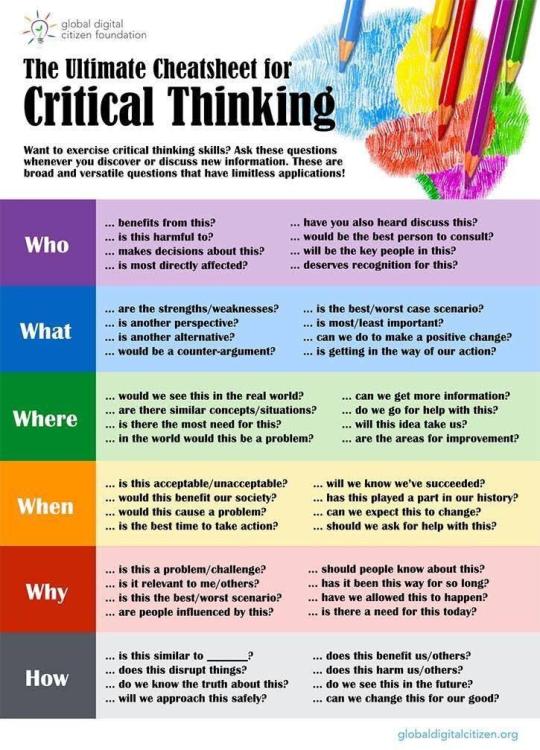
Critical Thinking Cheatsheet
#critical thinking#analysis#problem solving#thinking#life hacks#life tips#life lessons#motivation#mindset#psychology#educational
14K notes
·
View notes
Text
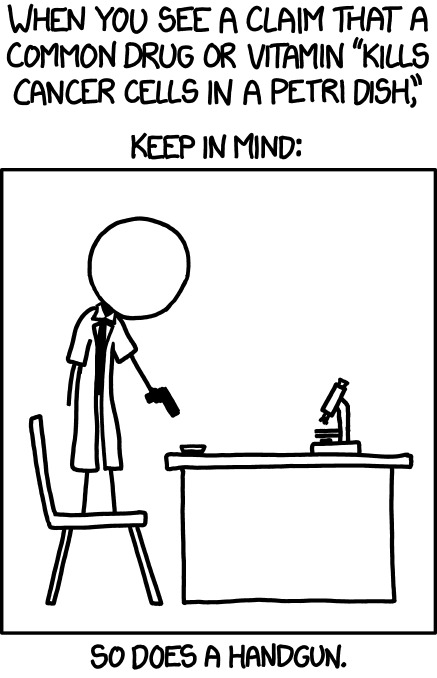
This has been a reminder
#don't trust miracle cures#critical thinking#health#medicine#cancer#cancer ment cw#misinformation#supplements#xkcd#if anyone still doesn't quite get it because i didn't for a hot second lol: you could literally dump a bucket of 'miracle cure' on cells#in a petri dish but if that amount of 'miracle cure' gets into human tissue it might kill em#in other words 'in a petri dish' means nothing because all the rules doses etc that would apply to actual human administration are out#fave
2K notes
·
View notes
Text
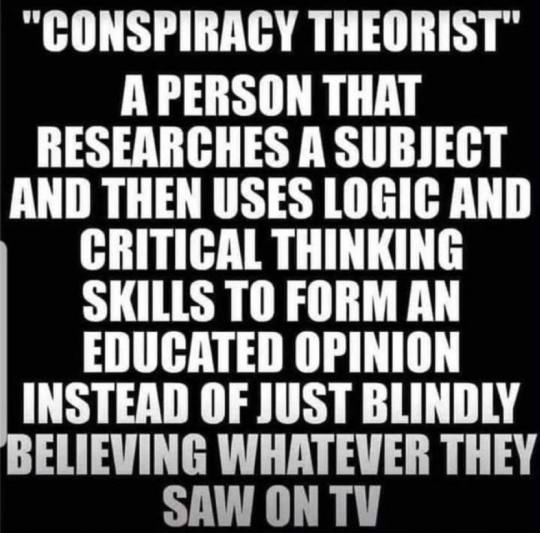
#pay attention#educate yourselves#educate yourself#knowledge is power#reeducate yourself#reeducate yourselves#think about it#think for yourselves#think for yourself#do your homework#do your research#do your own research#do some research#ask yourself questions#question everything#conspiracy theorists#logical thinking#critical thinking
417 notes
·
View notes
Text
Some hints about evaluating scientific studies
Firstly, understand that something being published in a scientific journal (or an academic journal for the social sciences) does not automatically make it true. Publishers profit from publishing novel, eye-catching, surprising research, which means they are more likely to publish positive results than ones that didn't find a connection between given variables. This means that scientists' careers benefit when they get positive results. Certain institutions also benefit from certain findings above others (a committee for research on "obesity" that is funded by a government organisation tasked with ending it, for example, is likely to try to stretch the evidence to find a link between body weight and poor health outcomes). So how do people evaluate scientific studies, especially without being scientists themselves?
Literature reviews
Literature reviews, which aim to assemble and summarise most of the available or influential papers on a given issue, can be a good place to start when trying to research that issue. Typically, scientific studies shouldn't only be evaluated on a case-by-case basis (since even well-designed studies can be contradicted by other, equally well-designed studies), but a full survey of the different results people have gotten should be taken.
Background information and conflicts of interest
Try to find out who funded a given study. Who published the study? What do these people stand to gain from the results of the study being accepted? (For example: you might pay special attention to the experimental design on a study on whether a certain essential oil helps to reverse hair loss that was carried out by a company that sells that oil.)
In theory, many journals call for study authors to declare any conflicts of interest they may have in a special section of the paper. This section should also list funding sources. You might also look up the authors on linkedin or something to find where they're employed; also look into whether another conglomerate owns that company, &c.
Experimental design
If the study involves a survey, have the authors of the paper provided the questions that people were asked, so that you can evaluate them for potential ambiguity or confusing wording? Not being transparent about the exact wording of questions is a sign that a study isn't trustworthy.
What's the sample size? Is it large enough for the claim the study is making to be reasonable? (More on this in the next section.)
Does the experimental design make sense with what the researchers wanted to study? Are the claims that they make in the conclusion section something that could reasonably be proven or suggested by the experiment that they performed?
Does the experimental design "bake in" an assumption of the truth of its hypothesis? (For example, measuring skeletons to argue that they fall into statistically significant size groupings by sex, using skeletons that you sorted into "male" and "female" groups based on their size, is clearly circular).
How was data collected? People might change their answers to a survey, for example, if they have to speak to a person to give them, rather than writing them down anonymously. Self-reported information (such as a survey aiming to figure out average height or average penis size) is also subject to bias. A good study should be transparent about how the authors collected their data, and be clear about how this could have affected their results.
Also regarding surveys: do the categories that the authors have divided respondents into make sense? Are these categories really mutually exclusive? If respondents were asked to sort themselves into categories (e.g., to select their own race or ethnicity), is there any guarantee that they all interpreted the question / the boundaries of these categories the same way? How would this affect the results?
Interpretation of results
Could anything other than the conclusion that the authors came to explain the results of their experiment? For example, a study finding a correlation between two variables and assuming that this means one variable causes the other ("being in a lot of stress causes short stature" or vise versa) could be missing a secret third thing which is in fact causing both of those things (e.g., poverty). Check to make sure that the authors considered other explanations for their findings and ruled them out (for example, by controlling for other variables such as socioeconomic status).
Are the results of the study generalisable to the population that the authors claim they're generalisable to? For example, the results may not be true for the entire population if only cisgender men between the ages of 30 and 40 were tested. Sampling biases can also affect generalisability—if I surveyed my college to try to find out the percentage of women in the total population, you might ask "but is your college sure to have the same percentage of women as the Earth does?"
Statistics
Are the results statistically significant, or are they within expected margins of error?
Many studies provide a p-value (a number between 0 and 1) for their results. In theory, a p-value represents the chance that the study's results could have been achieved by random chance. If you flip a coin ten times (so, your sample size is 10), it's not very odd to get heads six times and tails four times, and you wouldn't accept that as proof that the coin lands on heads more often than tails. The p-value for that result would be high (that is, there's a high chance that the coin appears unfair only because of random chance). On the other hand, if you flip a coin 100,000 times and it lands on heads 60,000 of those times, that's much better evidence that the coin is not a fair one. The p-value would be much lower. Typically, a p-value lower than 0.05 is considered statistically significant.
In practice, there's more than one way to calculate p-values, and so studies sometimes claim p-values that seem absurdly low. A low p-value is not proof of a claim in and of itself. Check to make sure that the authors of the paper also provide the raw data, and not just the p-values; this indicates a concern with other people being able to independently evaluate their results, rather than just trying to get The Best Numbers.
Citations
If the study cites something that seems foundational to their claims or interpretation, try tracing it back to the paper that was cited. Does the source actually claim what the authors of the first study said it did? Does the source provide proof or support for the claim, or does it seem flimsy, like a "common-sense" assumption?
Replication
Check the studies that cite the one you're currently looking at. Has anyone else tried to replicate the study? What were their results?
What if I really, really don't want to read scientific studies?
That's fine. Not everyone is concerned enough with specific scientific questions for regularly reading scientific papers to be reasonable for them. Just keep in mind that not everything in a scientific journal is necessarily true; that profit motives and personal and institutional bias impact results (e.g. when some studies revealed a lack of poor health outcomes for "obesity," and many scientists responded by calling it a "paradox" that needed to be "solved"); and that pop science and journalistic reporting on science are subject to distortions from the same sources.
Try finding commentators on scientific matters whose output you like, and evaluate their writing the same way you would evaluate any other critical writing.
#feel free to add on!#this doesn’t really incorporate the extent of my cynicism wrt to scientific establishment but. lol#reading comprehension#critical thinking
2K notes
·
View notes
Text
tools not rules: the importance of critical thinking
More than once, I’ve talked about the negative implications of Evangelical/purity culture logic being uncritically replicated in fandom spaces and left-wing discourse, and have also referenced specific examples of logical overlap this produces re, in particular, the policing of sexuality. What I don’t think I’ve done before is explain how this happens: how even a well-intentioned person who’s trying to unlearn the toxic systems they grew up with can end up replicating those systems. Even if you didn’t grow up specifically in an Evangelical/purity context, if your home, school, work and/or other social environments have never encouraged or taught you to think critically, then it’s easy to fall into similar traps - so here, hopefully, is a quick explainer on how that works, and (hopefully) how to avoid it in the future.
Put simply: within Evangelism, purity culture and other strict, hierarchical social contexts, an enormous value is placed on rules, and specifically hard rules. There might be a little wiggle-room in some instances, but overwhelmingly, the rules are fixed: once you get taught that something is bad, you’re expected never to question it. Understanding the rules is secondary to obeying them, and oftentimes, asking for a more thorough explanation - no matter how innocently, even if all you’re trying to do is learn - is framed as challenging those rules, and therefore cast as disobedience. And where obedience is a virtue, disobedience is a sin. If someone breaks the rules, it doesn’t matter why they did it, only that they did. Their explanations or justifications don’t matter, and nor does the context: a rule is a rule, and rulebreakers are Bad.
In this kind of environment, therefore, you absorb three main lessons: one, to obey a rule from the moment you learn it; two, that it’s more important to follow the rules than to understand them; and three, that enforcing the rules means castigating anyone who breaks them. And these lessons go deep: they’re hard to unlearn, especially when you grow up with them through your formative years, because the consequences of breaking them - or even being seen to break them - can be socially catastrophic.
But outside these sorts of strict environments - and, honestly, even within them - that much rigidity isn’t healthy. Life is frequently far more complex and nuanced than hard rules really allow for, particularly when it comes to human psychology and behaviour - and this is where critical thinking comes in. Critical thinking allows us to evaluate the world around us on an ongoing basis: to weigh the merits of different positions; to challenge established rules if we feel they no longer serve us; to decide which new ones to institute in their place; to acknowledge that sometimes, there are no easy answers; to show the working behind our positions, and to assess the logic with which other arguments are presented to us. Critical thinking is how we graduate from a simplistic, black-and-white view of morality to a more nuanced perception of the world - but this is a very hard lesson to learn if, instead of critical thinking, we’re taught instead to put our faith in rules alone.
So: what does it actually look like, when rule-based logic is applied in left-wing spaces? I’ll give you an example:
Sally is new to both social justice and fandom. She grew up in a household that punished her for asking questions, and where she was expected to unquestioningly follow specific hard rules. Now, though, Sally has started to learn a bit more about the world outside her immediate bubble, and is realising not only that the rules she grew up with were toxic, but that she’s absorbed a lot of biases she doesn’t want to have. Sally is keen to improve herself. She wants to be a good person! So Sally joins some internet communities and starts to read up on things. Sally is well-intentioned, but she’s also never learned how to evaluate information before, and she’s certainly never had to consider that two contrasting opinions could be equally valid - how could she have, when she wasn’t allowed to ask questions, and when she was always told there was a singular Right Answer to everything? Her whole framework for learning is to Look For The Rules And Follow Them, and now that she’s learned the old rules were Bad, that means she has to figure out what the Good Rules are.
Sally isn’t aware she’s thinking of it in these terms, but subconsciously, this is how she’s learned to think. So when Sally reads a post explaining how sex work and pornography are inherently misogynistic and demeaning to women, Sally doesn’t consider this as one side of an ongoing argument, but uncritically absorbs this information as a new Rule. She reads about how it’s always bad and appropriative for someone from one culture to wear clothes from another culture, and even though she’s not quite sure of all the ways in which it applies, this becomes a Rule, too. Whatever argument she encounters first that seems reasonable becomes a Rule, and once she has the Rules, there’s no need to challenge them or research them or flesh out her understanding, because that’s never been how Rules work - and because she’s grown up in a context where the foremost way to show that you’re aware of and obeying the Rules is to shame people for breaking them, even though she’s not well-versed in these subjects, Sally begins to weigh in on debates by harshly disagreeing with anyone who offers up counter-opinions. Sometimes her disagreements are couched in borrowed terms, parroting back the logic of the Rules she’s learned, but other times, they’re simply ad hominem attacks, because at home, breaking a Rule makes you a bad person, and as such, Sally has never learned to differentiate between attacking the idea and attacking the person.
And of course, because Sally doesn’t understand the Rules in-depth, it’s harder to explain them to or debate with rulebreakers who’ve come armed with arguments she hasn’t heard before, which makes it easier and less frustrating to just insult them and point out that they ARE rulebreakers - especially if she doesn’t want to admit her confusion or the limitations of her knowledge. Most crucially of all, Sally doesn’t have a viable framework for admitting to fault or ignorance beyond a total groveling apology that doubles as a concession to having been Morally Bad, because that’s what it’s always meant to her to admit you broke a Rule. She has no template for saying, “huh, I hadn’t considered that,” or “I don’t know enough to contribute here,” or even “I was wrong; thanks for explaining!”
So instead, when challenged, Sally remains defensive: she feels guilty about the prospect of being Bad, because she absolutely doesn’t want to be a Bad Person, but she also doesn’t know how to conceptualise goodness outside of obedience. It makes her nervous and unsettled to think that strangers could think of her as a Bad Person when she’s following the Rules, and so she becomes even more aggressive when challenged to compensate, clinging all the more tightly to anyone who agrees with her, yet inevitably ending up hurt when it turns out this person or that who she thought agreed on What The Rules Were suddenly develops a different opinion, or asks a question, or does something else unsettling.
Pushed to this sort of breaking point, some people in Sally’s position go back to the fundamentalism they were raised with, not because they still agree with it, but because the lack of uniform agreement about What The Rules Are makes them feel constantly anxious and attacked, and at least before, they knew how to behave to ensure that everyone around them knew they were Good. Others turn to increasingly niche communities and social groups, constantly on paranoid alert for Deviance From The Rules. But other people eventually have the freeing realisation that the fixation on Rules and Goodness is what’s hurting them, not strangers with different opinions, and they steadily start to do what they wanted to do all along: become happier, kinder and better-informed people who can admit to human failings - including their own - without melting down about it.
THIS is what we mean when we talk about puritan logic being present in fandom and left-wing spaces: the refusal to engage with critical thinking while sticking doggedly to a single, fixed interpretation of How To Be Good. It’s not always about sexuality; it’s just that sexuality, and especially queerness, are topics we’re used to seeing conservatives talk about a certain way, and when those same rhetorical tricks show up in our fandom spaces, we know why they look familiar.
So: how do you break out of rule-based thinking? By being aware of it as a behavioural pattern. By making a conscious effort to accept that differing perspectives can sometimes have equal value, or that, even if a given argument isn’t completely sound, it might still contain a nugget of truth. By trying to be less reactive and more reflective when encountering positions different to your own. By accepting that not every argument is automatically tied to or indicative of a higher moral position: sometimes, we’re just talking about stuff! By remembering that you’re allowed to change your position, or challenge someone else’s, or ask for clarification. By understanding that having a moral code and personal principles isn’t at odds with asking questions, and that it’s possible - even desirable - to update your beliefs when you come to learn more than you did before.
This can be a scary and disquieting process to engage in, and it’s important to be aware of that, because one of the main appeals of rule-based thinking - if not the key appeal - is the comfort of moral certainty it engenders. If the rules are simple and clear, and following them is what makes you a good person, then it’s easy to know if you’re doing the right thing according to that system. It’s much, much harder and frequently more uncomfortable to be uncertain about things: to doubt, not only yourself, but the way you’ve been taught to think. And especially online, where we encounter so many more opinions and people than we might elsewhere, and where we can get dogpiled on by strangers or go viral without meaning to despite our best intentions? The prospect of being deemed Bad is genuinely terrifying. Of course we want to follow the Rules. But that’s the point of critical thinking: to try and understand that rules exist in the first place, not to be immutable and unchanging, but as tools to help us be better - and if a tool becomes defunct or broken, it only makes sense to repair it.
Rigid thinking teaches us to view the world through the lens of rules: to obey first and understand later. Critical thinking teaches us to use ideas, questions, contexts and other bits of information as analytic tools: to put understanding ahead of obedience. So if you want to break out of puritan thinking, whenever you encounter a new piece of information, ask yourself: are you absorbing it as a rule, or as a tool?
10K notes
·
View notes
Text
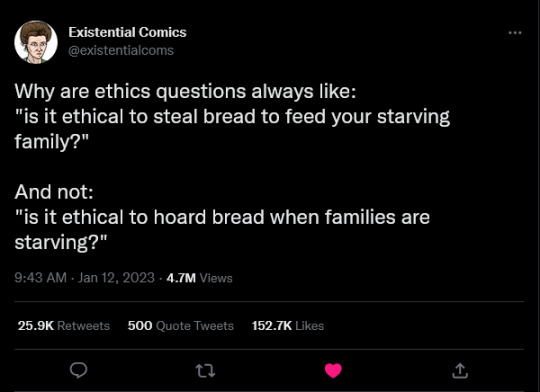
#ethics#critical thinking#capitalism#society#economics#poverty#homelessness#class struggle#inequality#class war#corporatism#working class#class warfare#authoritarianism#communism#anarchism#socialist#antifascist#anarchocommunism#revolution
6K notes
·
View notes
Text
"Let people enjoy things", "It's not that deep", "Stop being a hater", No.
You are capable of criticizing something and still enjoying it. Criticism should add to your enjoyment of the thing. Contextualizing and analyzing media is the only true sign that you enjoy it instead of just consume it. Stop selling the straggling iotas of your final brain cell to a fascio-capitalist system that wants to gorge you til you burst. Not consuming anything is better than blindly inhaling whatever is put in front of you without discretion.
Be an intellectual and have respect for yourself so you can have some sugary Wattpad fanfic and a Netflix reality TV show for dessert.
#yes that means pry your eyes off of tiktok#use that brain baby!!!#intellectual#intellectualism#anti capitalism#antifascism#provoke thought#THINK#english literature#american literature#gothic literature#contemporary literature#romanticism#transcendentalism#surrealism#creative writing#booktok#anti booktok#hater#hater mentality#critical thinking#media literacy#treat yourself#little treat#rewards
601 notes
·
View notes
Text
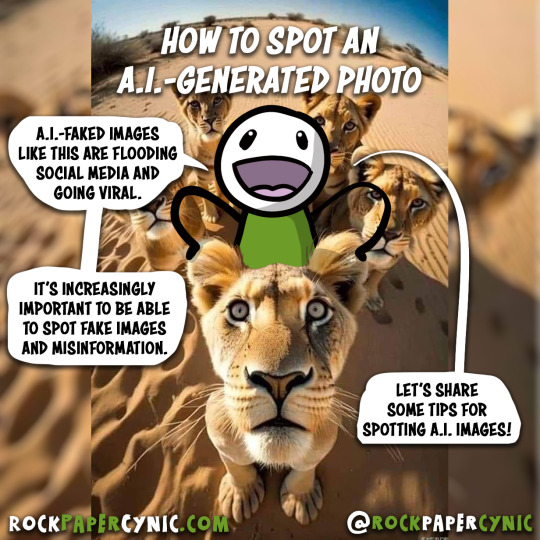
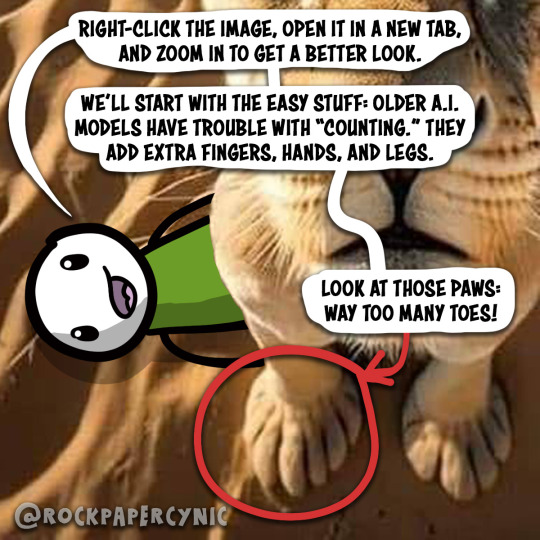
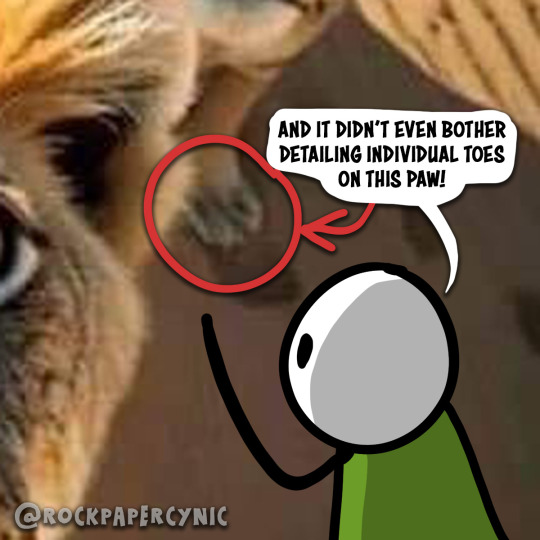

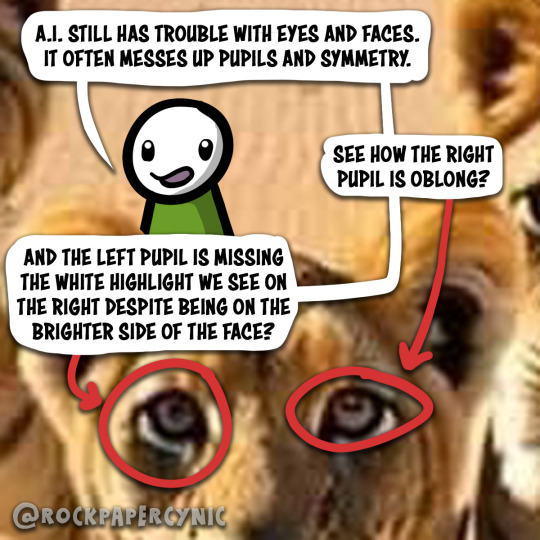
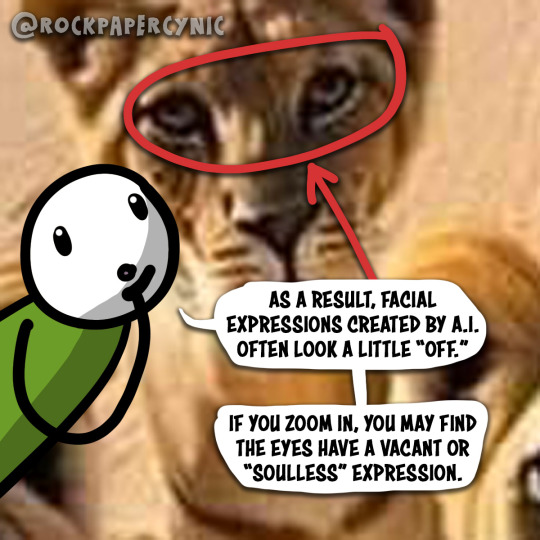
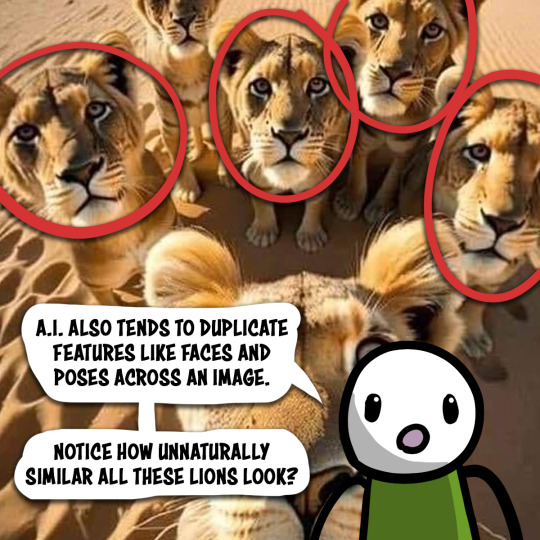
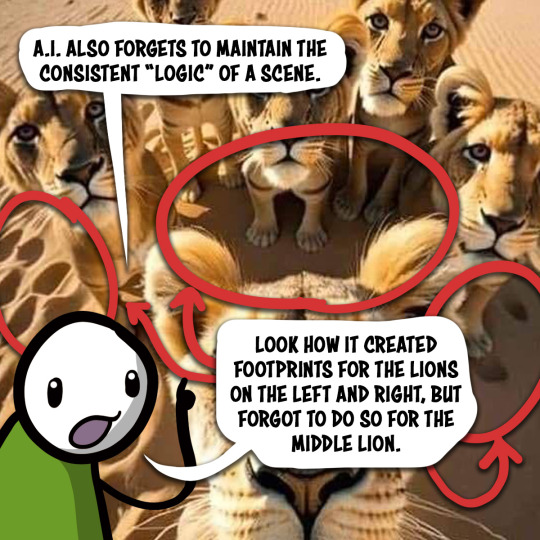
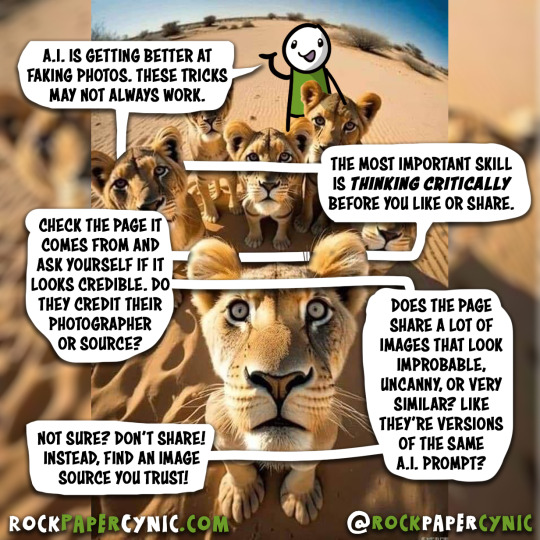
The internet is flooded with AI-generated photos and they're getting harder to spot.
Most of the time AI is used for click-farming, but lately images have been used in fake news stories and product scams.
Most important: THINK CRITICALLY. AI will eventually get too good to make obvious mistakes. Being media literate means checking not just if an image is real, but if the source is trustworthy.
If you're not sure, don't share! You might be spreading misinformation.
20K notes
·
View notes
Text
1/3 of our country is lost to a cult. This is not an anomaly in the Republican Party.
Critical thinking gone.
#donald trump#maga#make america sane again#republican party#void of vision#critical thinking#make america great again#own the libs#abortion#2024 presidential election#trump 2024#wild#us politics#vote blue#vote democrat#vote harris#breaking news#republikkkan stupidity#news#usa#patriots#the good liars
347 notes
·
View notes
Text
There was never going to be any form of Jewish self defense that the world would deem acceptable, and there was never going to be any act of anti-Jewish terrorism that the world would deem unacceptable.
There is nothing Israel could ever do to defend itself that wouldn’t be accused of going too far, of being “way beyond self defense.” There is no method of Israeli self defense that wouldn’t be maligned as “genocide.”
Inversely, there is no atrocity that could ever be committed against Jews that wouldn’t be denied/excused/justified. There is no level of violence against Jews, however gruesome, however blatant in its goal of genocide and targeting innocents, however many children and babies are burned alive and kidnapped, that wouldn’t be justified as “resistance,” as something that the Jews must have provoked, as the very least that Jews deserve, as something that the terrorists were driven to and couldn’t possibly be expected not to do.
No act of violence against Jews was ever not going to be called “resistance,” and no response from Israel was ever not going to be called a “genocide.”
The only Jewish country in the world was never not going to be maligned as the worst country in the world.
For fuck’s sake, use some critical thinking skills.
#for thousands of years everyone thought they had a really good reason to hate and kill the Jews#that they were even righteous for it#you are not immune to propaganda#antisemitism#israel#jumblr#media bias#critical thinking#critical thinking skills
627 notes
·
View notes
Text
Wading through native plant gardening resources and trying to inform other people, both through posts and in real life, has shifted my point of view on what misinformation is and does.
I don't really know what to do with it yet. But I've realized that it's often impossible to be accurate when teaching people who know very little about a subject. You have to simplify incredibly complex, nuanced things to the point where it feels like a total hack job. If you specify every complexity of the thing you're explaining, the people you're talking to don't absorb the core principle.
Various posts i've made about ecology and gardening stuff have been called "misinformation" and I'm just like. Think of it as a highschool textbook. Half of what it says is wrong but you must understand the "wrong" model to move beyond it.
8K notes
·
View notes